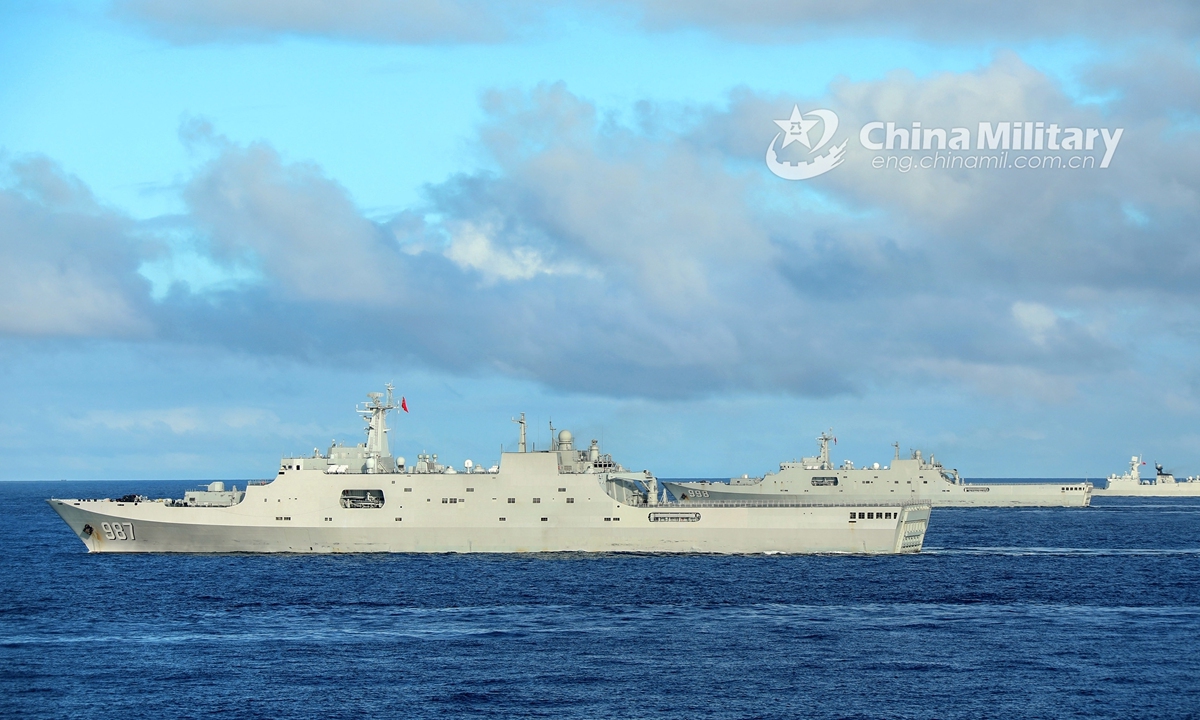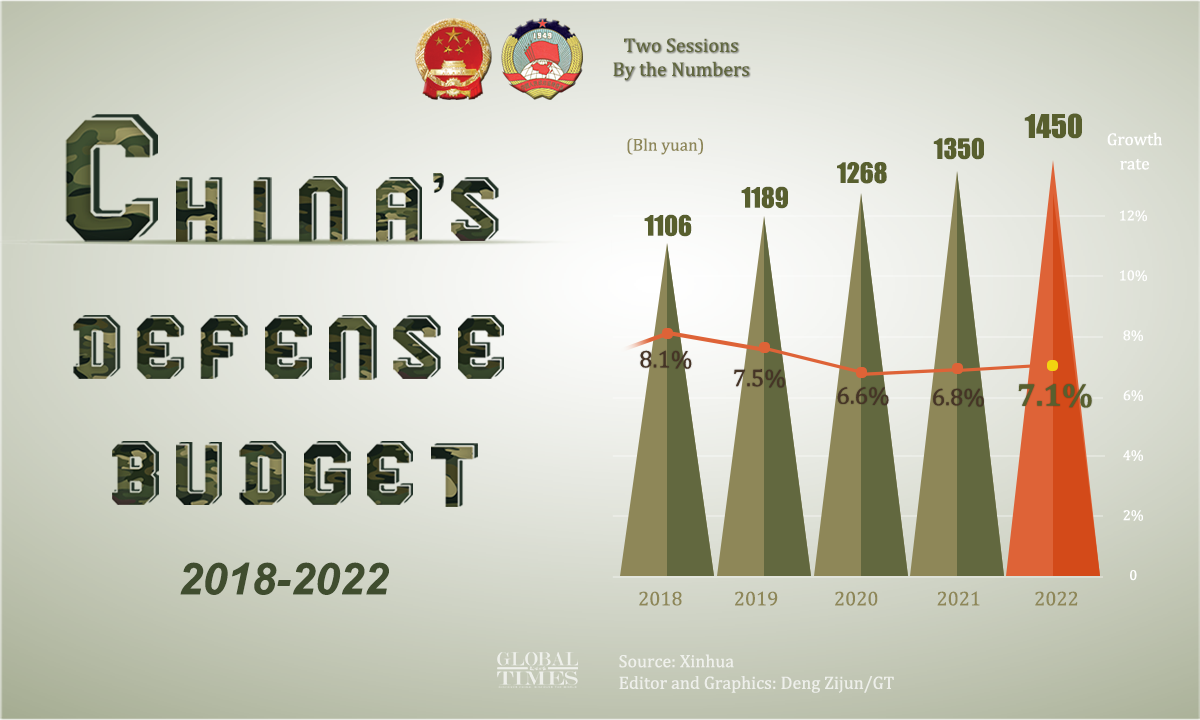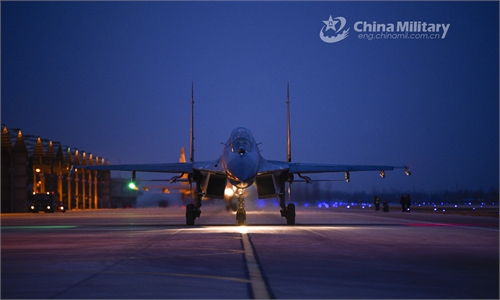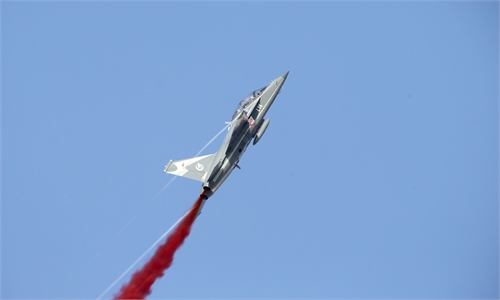China anticipated to steadily, reasonably expand defense budget amid military spending growth around world

The amphibious dock landing ships Wuzhishan (Hull 987), Kunlunshan (Hull 998) and Changbaishan (Hull 989) attached to a landing ship flotilla with the navy under the PLA Southern Theater Command steam alongside in waters of the South China Sea during a maritime training exercise on November 18, 2020. The exercise lasted four days, focusing on 10 subjects including comprehensive defense, Landing Craft Air Cushion's (LCAC) transfer, visit, board, search and seizure (VBSS) operation, and live-fire operations. (eng.chinamil.com.cn/Photo by Liu Jian)
It is likely that China will steadily and reasonably increase its military expenditure in 2023, according to predictions made by experts and analysts the Global Times has reached, as they cited China's national defense modernization and the security tensions China is being confronted with among the reasons that incentivize the growth.
A defense budget draft for the year 2023 is scheduled to be released at the opening of the annual session of the National People's Congress (NPC), the country's top legislature, on Sunday.
China's defense budget for 2022 was set at 1.45 trillion yuan ($230 billion), an increase of 7.1 percent, faster than the 6.8 percent in 2021 and 6.6 percent in 2020.
The country has maintained single-digit growths in its annual defense budget since 2016.
Chinese military expert Fu Qianshao told the Global Times that China will very likely continue to steadily expand its defense budget in 2023.
The modernization of the Chinese People's Liberation Army requires a large funding in order to procure advanced equipment and maintain a high level of training, Fu said.
National defense modernization takes decades, requiring China to maintain a certain level of defense spending for many years, Fu said. Citing the very low military expenditure when China had to focus on economic development before the 2000s, he said that China is only picking up what has been left.
Song Zhongping, a Chinese military expert and TV commentator, told the Global Times that China's defense budget growth rate for 2023 could be higher than that of 2022.
Over the past year, the Russia-Ukraine conflict has led to a severe deterioration in the global security situation. Around China, then US house speaker Nancy Pelosi provocatively visited China's Taiwan region in August 2022, the US frequently hyped a potential conflict between China and the US, and Japan has broken away from its defense-only principle and has started procuring offensive missiles that could reach China.
Under such an unfavorable situation, China needs to enhance its armed forces' combat readiness, including boosting the procurement of new weapons and equipment, intensifying realistic combat-oriented exercises, and improving troop welfare, which all require extra funding, Song said.
Overcoming headwinds including the COVID-19 pandemic and geopolitical tensions, China's GDP expanded by 3 percent year-on-year in 2022, and buoyed by the country's optimized epidemic response and effective pro-growth policies, some economists predicted China's GDP may post a strong 6 percent year-on-year growth at most in 2023.
This will lay a solid foundation for a possible defense budget growth, experts said.

China's defense budget in 2022 Graphic: Deng Zijun/GT
Global expenditure hikes
The latest US National Defense Authorization Act signed in December 2022 authorized $817 billion in spending for the Pentagon for fiscal year 2023, CNN reported at the time.
This means that US military expenditure remains three to four times that of China, retaining its position as the top of the world by far, at a time when some US officials and military leaders have been hyping a potential military conflict with China.
Japan in December 2022 approved a record-high 6.8 trillion yen ($51 billion) draft defense budget for fiscal 2023, marking a whopping 26.3 percent increase from 2022, after pledging to acquire capabilities to strike other countries in a major policy shift under the country's war-renouncing constitution, Kyodo News reported at the time.
Some other countries like India, the UK, France, Germany and Australia are all planning to increase their defense spending, according to media reports.
Over the past few years, China's military spending has been kept at about 1.3 percent of GDP, while the figure for the US is about 3.5 percent, and the NATO guideline is 2 percent.
If China joins the global trend of defense spending hikes, it should not be considered as participating in an arms race, as China's military expenditure accounts for only a small proportion of its GDP, a Beijing-based military expert who requested anonymity told the Global Times.
Considering the world average, China has room to further raise its defense budget to meet the corresponding status as a major country in the world, the expert said.
China follows a national defense strategy that is defensive in nature, which means that its military spending is used to safeguard the country's national sovereignty, territorial integrity and development interests, rather than to violate others and build up hegemony like the US, the expert said.
A strong Chinese military is a positive asset to the world, analysts said. In terms of the traditional security field, it brings balance and constitutes a stable factor, and in terms of the non-traditional security field, it actively provides international public security goods like far sea escorts, peacekeeping and humanitarian aid, they said.




